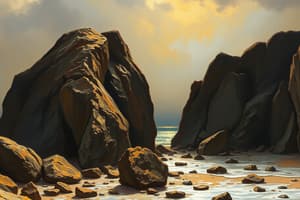Podcast
Questions and Answers
What type of igneous rock is formed from lava that cools quickly on the Earth's surface?
What type of igneous rock is formed from lava that cools quickly on the Earth's surface?
- Sedimentary
- Metamorphic
- Extrusive Igneous (correct)
- Intrusive Igneous
What is Intrusive Igneous rock?
What is Intrusive Igneous rock?
Rock that forms from magma cooling slowly beneath the Earth's surface.
What is Metamorphic rock?
What is Metamorphic rock?
Rock that has been transformed by heat and pressure.
What defines Sedimentary rock?
What defines Sedimentary rock?
What is a Volcanic Eruption?
What is a Volcanic Eruption?
What does Uplifting mean in geology?
What does Uplifting mean in geology?
What is the role of Heat and Pressure in the rock cycle?
What is the role of Heat and Pressure in the rock cycle?
What is Weathering and Erosion?
What is Weathering and Erosion?
Where do rocks come from?
Where do rocks come from?
What is sediment?
What is sediment?
Flashcards are hidden until you start studying
Study Notes
Rock Cycle Terminology
-
Extrusive Igneous: Formed when magma erupts onto the Earth's surface and cools quickly, resulting in fine-grained rocks, such as basalt and pumice.
-
Intrusive Igneous: Created when magma cools slowly beneath the Earth’s surface, leading to coarse-grained rocks like granite and diorite.
-
Metamorphic: Rocks that have been transformed from their original form due to heat, pressure, or chemically active fluids, examples include schist and gneiss.
-
Sedimentary: Formed from the accumulation and compression of mineral and organic particles, leading to layered structures; common types include sandstone, limestone, and shale.
-
Volcanic Eruption: Occurs when there is an explosive release of magma, gases, and ash from a volcano, significantly influencing the landscape and the formation of igneous rocks.
-
Uplifting: The geological process that raises rock layers from deeper depths to the surface, contributing to the rock cycle and the exposure of previously buried rocks.
-
Heat and Pressure: The key conditions that lead to the metamorphosis of rocks, involving significant temperature increases and intense pressure that alter mineral structures.
-
Weathering and Erosion: Processes that break down rocks into smaller particles and transport them elsewhere, which contributes to the formation of sedimentary rocks.
-
Where do Rocks come from?: Rocks form through natural processes involving cooling, compression, or transformation over time under varying conditions of heat and pressure.
-
Sediment: Comprises small rock particles and organic materials that can accumulate, get buried over time, and become compacted and cemented into new sedimentary rock.
Studying That Suits You
Use AI to generate personalized quizzes and flashcards to suit your learning preferences.




